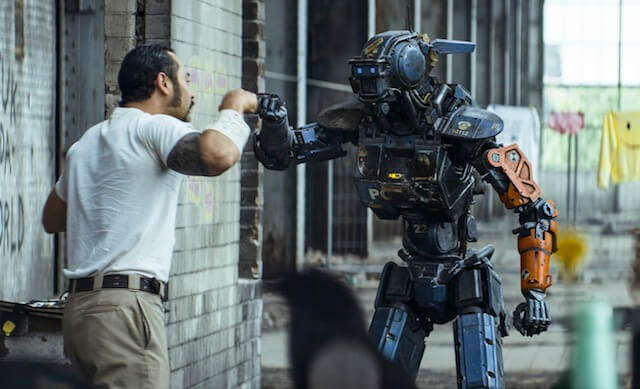‘Chappie’ Yasujiro Ozu spent most of the back part of his career cranking out films so similar — with titles like “Late Spring,” “Early Summer,” “Late Autumn,” etc. — that you could be forgiven for getting some of them mixed up. He approached movies the way a chef does a signature dish. So technically it shouldn’t be a problem that, with “Chappie,” director Neill Blomkamp (“District 9”) has now made three clangy, high-concept, hyperviolent sci-fi actioners that feature robots or man-’bot hybrids plus edgy but shallow social commentary in a row. Sure, Blomkamp isn’t exactly making sushi here. Like his usual cohort Sharlto Copley, director Neill Blomkamp is not gentle. He’s ecstatically sloppy — a sugar-high kid with too many toys, running around a playroom knocking things over. This lack of care can be thrilling, as in the relentless, squirty climax of “District 9.” And it can be troubling, as in the way, in the same film, some of the baddies are poor, interned black South Africans. “Chappie” has a different problem: It doesn’t seem particularly engaged with the world it itself has dreamt up. It sets itself up with a promising premise — a robot cop (or, if you will, a “RoboCop”) who gains sentience, not unlike Johnny-5 in “Short Circuit” — but can barely be bothered to explore it, even for its own pulpy kicks. Willed into being by a perpetually wide-eyed Dev Patel, the one dubbed Chappie (voice and mo-cap by a typically excitable Copley) winds up adopted by a gang of punk thieves right out of a “Mad Max” film. (They’re led by a guy named Ninja played by a guy credited as “Ninja,” but whose real name is Watkin Tudor Jones.) They raise Chappie as their own, tagging him with graffiti and bling and teaching him to speak in a borderline offensive “street” patois. They also — in the film’s one decent joke — cleverly circumvent his refusal to kill by telling him stabbing people just makes them sleep better. Is Chappie really sentient or is it just a delusion? Are we the products of our birth or our surroundings? And when the subject of consciousness transferring comes up, are the results really transfers of the self or just counterfeit copies? Blomkamp raises a couple of these but answers none. No matter. He plows sans abandon through the plot, which is a patchwork construction of giant chunks of other movies, including Blomkamp’s own. (Apparently he doesn’t know how to start a film without a news documentary catching us up.) The biggest hunks come from “RoboCop,” complete with another, bigger cop-’bot run by a jerk nemesis — here, a hotheaded Hugh Jackman and the worst hair this side of a Javier Bardem character. “Chappie” does find Blomkamp largely abandoning one of his bigger, albeit also better gifts: the uniquely messy dismantling of bodies into squishy goo. There’s a hint of studio-censorious elision in the way it obscures or cuts around violence, but this could also be read as a good thing: Blomkamp just not succumbing to fanboy service. In fact, dodgy as it is there’s a nobility and honor to “Chappie.” Like Copley’s probably divisive but game turn, it’s committed to a vision. It may be a junkyard construction of other people’s movies — and it’s no coincidence that Blomkamp likes to set his films amidst actual junk — but it goes off on its own path, eventually. In fact its finale takes a genuinely unexpected, not all that trodden turn. Strictly speaking “Chappie” ends happily, but not the kind you’d think — one that’s scientifically progressive in ways that are forward-thinking and, for the flesh-bound human, oddly unnerving. Blomkamp may be the first filmmaker, or at least arguably since Kubrick, who seems totally OK with humankind evolving to a post-human state. Long live the dead flesh.
Director: Neill Blomkamp
Stars: Sharlto Copley, Hugh Jackman
Rating: R
2 (out of 5) Globes
Review: ‘Chappie’ is sloppy, even for Neill Blomkamp, but oddly noble

Stephanie Blomkamp
Follow Matt Prigge on Twitter @mattprigge


















